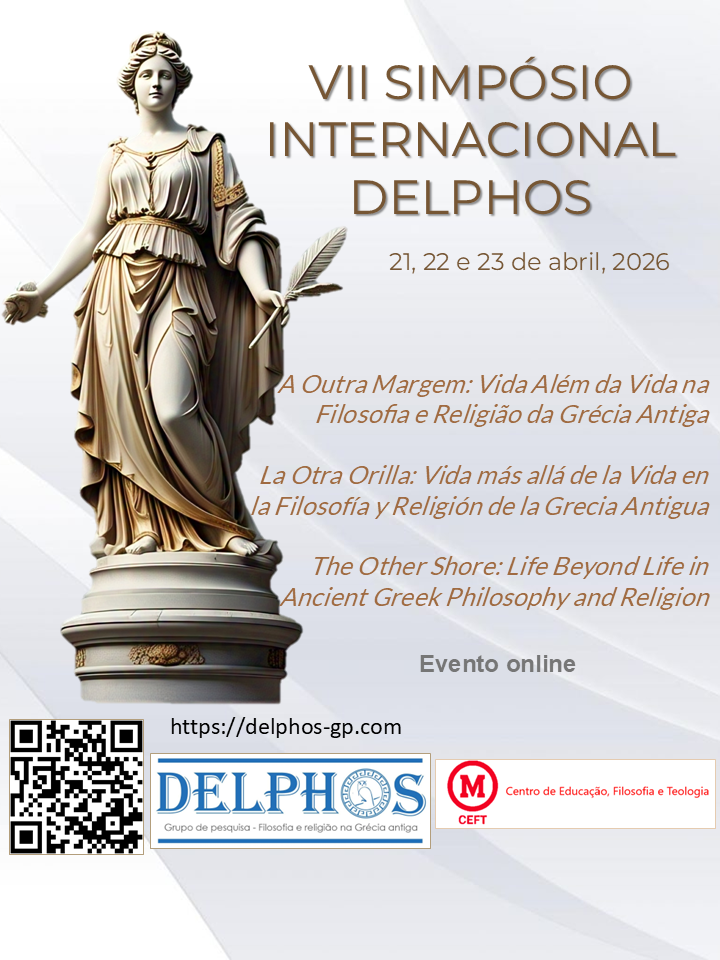


CALL FOR PAPERS
VII DELPHOS INTERNATIONAL SYMPOSIUM 2026

Event Coordinators:
- Dr. Jorge Luis Gutiérrez, DELPHOS, Brazil.
- Dr. David Torrijos Castrillejo, Universidad San Dámaso de Madrid, Spain.
Scientific Committee:
- Dr. David Torrijos Castrillejo, Universidad San Dámaso de Madrid, Spain. (Chair)
The composition of the scientific committee will be announced soon
Organizing Committee:
- Jorge Luis Gutiérrez, Delphos, Brazil.
- David Torrijos Castrillejo, Universidad San Dámaso de Madrid. Spain.
- José Antonio García-Lorente, Universidad de Murcia, Spain.
- Ângela Zamora Cilento, Mackenzie University, São Paulo, Brazil.
- Rosario Neuman Lorenzini, Universidad San Dámaso de Madrid, Spain.
- Marcelo Martins Bueno, Mackenzie University, Brazil.
- André da Paz, University of Brasília, Brazil.
The DELPHOS research group, in partnership with the Philosophy Course at Mackenzie University, is pleased to invite researchers, students, and professors to participate in the VII Delphos International Symposium 2026. The general theme of the Symposium is "Philosophy and Religion in Ancient Greece", and the specific theme for this year is The Other Shore: Life Beyond Death in the Philosophy and Religion of Ancient Greece.
The event will be held virtually on April 21st, 22nd, and 23rd, 2026. The detailed program will be announced soon.
We invite the entire academic community to participate in this event, which promises to be a valuable opportunity to discuss and reflect on philosophy and religion in Ancient Greece.
About the Proposed Theme
The Other Shore: Life Beyond Life in the Philosophy and Religion of Ancient Greece
Ancient Greece was a crucible of ideas and beliefs that shaped Western civilization. Among the most fascinating and complex are the conceptions about life after death, which are intertwined in the philosophy and religion of the time. In this context, the metaphor of "the other shore" refers to the transition from mortal life to eternity, a theme that occupied a central place in the philosophical and religious reflection of the ancient Greeks...
Submission Guidelines for Presentations
Those who wish to present a paper must submit an abstract with the characteristics indicated below by August 12, 2024.
Abstract Submission Guidelines
To register, please send a Word document to jorgelrg@uol.com.br with the subject "VII Delphos International Symposium 2026", including the following information:
- *Paper Title*: title of the paper to be presented.
- *Author's Name*: name of the author (must be the same as the presenter).
- *Category*: student or professor.
- *Academic Degree*: Bachelor's, Master's, or Ph.D.
- *Institutional Affiliation*: current institutional affiliation.
- *Abstract*: abstract of no more than 600 words.
Important Information
- Papers (presentations) that focus on the relationship between philosophy and religion in ancient Greece, specifically on the theme "The Other Shore: Life Beyond Death in the Philosophy and Religion of Ancient Greece", will be accepted.
- *Virtual Event*: The event will be held entirely online.
- *Field Completion*: Please fill out all fields. Only complete submissions will be considered.
- *Abstract Submission Deadline*: March 15, 2026.
- *Publication of Accepted Papers*: March 20, 2026.
- *Presentation Time*: 15 minutes, followed by 5 minutes of questions and debate.
- *Paper Limit per Proposer*: Each proposer may submit only one paper proposal.
- *Presentation*: Only the author of the paper may present; presentation by another person is not allowed.
- *Certificate*: Mackenzie University will issue a certificate attesting to the presentation of the paper.
Download the Poster
View the Poster

